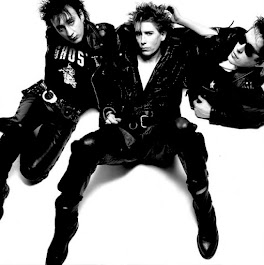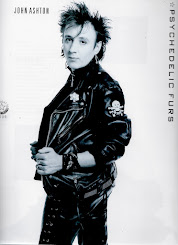In '77, the noises crystallised around Butler’s deadpan nicotine drawl, pipecleaner crouch and pink frock coat. Brother Tim came in on wrap-around shades and pneumatic bass, Duncan Kilburn added honking sax, Roger 'Dog' Morris attempted to shape some rhythmic sense from the bitter maelstrom, drummers joined and drowned, John Ashton started soaring around the sarcasm on lead guitar and, just to get up everyone's nose, they called themselves the Psychedelic Furs. Richard: "The name was my antagonism towards how narrow- minded punk was- I mean, it was supposed to be anarchistic but it didn't leave enough room for creative anarchy and no way was punk as creatively anarchistic as psychedelic music was. I think anything is psychedelic that opens your head. it's anything that puts you... somewhere else. ideally, I’d like to think we're making people think a bit and look at things from another point of view.'
By '79, the band were attracting a following, Vince Ely of the Photons joined on drums, a Peel session sent a shock across the airwaves and CBS moved in. The first single, "We Love You" was a conscious parody of the Stones' earlier two fingered salute to the bastions of society, cynical and angry as only frustrated idealism can be. For the Furs, the subversive spirit of psychedelia was still so important that, in order to recapture its disoriented and disorienting vision, they spent the whole of "The Psychedelic Furs", their debut album, violently trashing the genre. it was something to do with outweirding the weirdos aided and abetted by producer Steve Lillywhite's brutal wall of sound. the ensuing 'beautiful chaos’ tour presented an unrelenting and unresolved tension between cacophony and melancholy, between anger at what is and sorrow at what could have been. The Furs burned and frazzled, schizophrenically stretched between their positive attempt to change the charts and their negative abhorrence of all they stood for. The second album, "Talk Talk Talk" was a complex masterpiece of studied confusion; "a wall of melody as opposed to a wall of sound.' again produced by Lillywhite, it raged equally against conformity and the cosmetic fashion alternatives being offered by others. A carefully confused collection of other people's quotes 'cut up' and crossword- puzzle clues, it meant things within the immediate context of the songs and it rippled with reminders from its sources, rich to the point of crack-up. The Furs were about to go too far. from bedsits in Muswell Hill, the band flourished on a dangerous contradiction between decadence and distance, between chaos and wicked criticism. It was as if they were living a lifestyle they loathed just to get on the inside and rip out its guts. There was as much of a sneer as a swagger to butler's hedonism, a deliberate, tortured dimension to his self-immolation but the booze and the benders were winning.
As the Furs prepared for their third album, Duncan and Roger departed as the rest sought to stretch themselves beyond the nihilism of "Talk Talk Talk" and its thematic core: "don't believe in anything". they found inspiration at Woodstock with Todd Rundgren as producer and the "Forever Now'' LP tentatively pursued a new desire for more direct accessibility as evinced by the acclaimed smokey crooner, "Love My Way". A shock to fans, it was a deliberate bid to retain ambiguity, to escape the traps of reputation, to twist their antagonism into a demand for personal liberty and the band blossomed on a world tour of bombed-out narcissism. Vince quit and ex-Birthday Party drummer Phill Calvert joined for a while and, by the end of '83, Richard reckoned if he could translate looks into money he'd be a millionaire while John laconically reminded him if that were so, he'd still be broke in the morning.
The Butler brothers moved to New York and Richard, aware of a growing need to communicate beyond the converted, was anxious to make a record that eschewed the impulse to appear enigmatic and got down to saying things in a language anyone could understand. the Furs wanted to be heard and, in Keith Forsey, the man behind Billy Idol and "Flashdance", they found an ally as well as a producer. the album, "Mirror Moves", was magnificent, crafted for radio play and it worked. "Heaven", a song of belonging, immediately entered the British top 30, the album reached the top 10 and, in America, a whole new audience was discovering them through a hitherto reluctant sense of poise and melody. Compounding their success, the band toured for nine months, visiting 11 countries, then took a break, Richard using the time to record an idiosyncratic version of "Alabama Song" for "Lost in the Stars", a compilation album of "single composer interpretations" of Kurt Weill, released by A&M&m. Ironically, history was catching up on them too.
The Furs were namechecked in Brett Easton Ellis' exquisitely excruciating and highly-acclaimed la-based novel "Less Than Zero", the "nausea" of the me-generation, a neat reversal of the band's role as culture vultures. They fell even more fortunate of the post modernist search through the debris of cliche for that last slashing phrase when John Hughes, co-writer of the National Lampoon films and director of "The Breakfast Club" shot "Pretty in Pink”, a pleasing high school drama based around a song from "Talk Talk Talk''. The Furs rerecorded the song for the soundtrack and found themselves with another worldwide hit on their hands while they holed up in hansa by the wall in Berlin. Recording "Midnight To Midnight", their new album, with producer Chris Kimsey who'd previously worked with the Stones, Marillion and Killing Joke.
Returning in July '86 to headline the Glastonbury festival with a new band comprising the crucial trio of Richard, Tim and John, plus Mars Williams on horns, Paul Garisto on drums, Marty Williamson on guitar and Roger O'Donnell on keyboards, it was obvious that the old Furs gang thing had gone, replaced by a fresh, athletic approach. Richard off the bev, was fit and aerobic and singing with a rasping sensitivity. The single, "Heartbreak Beat" went for your feet as well as your head and confirmed that the Furs had entered the mainstream on their own terms. "Angels Don’t Cry'', another single off the album, is their tenderest moment yet, Butler’s characteristic yearning for the heaven of possibility and his hatred of the hell of conformity still as precariously balanced as ever but voiced with more clear-headed understanding than previous tantrums. This summer '87, "Midnight To Midnight” comes to town. the tactics, as ever, may be different but the battle's still the same - Steve Sutherland
Band bios from the tour program can be found here:
Richard Butler - Vocals
John Ashton - Lead guitarist
Tim Butler - Bassist
Mars Williams - Saxophonist
Paul Garisto - Drummer
Marty Williamson - Rhythm guitarist
Roger O'Donnell - Keyboards

















